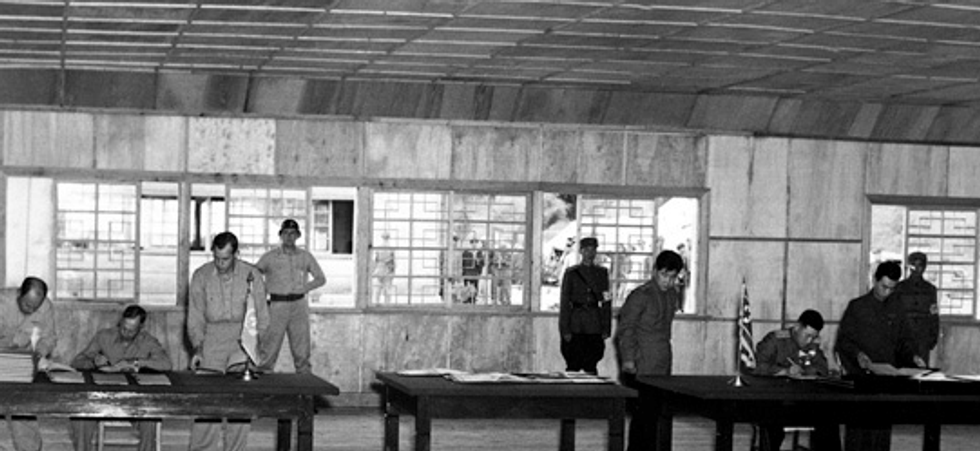Sixty years ago today, the United States, North Korea and China sat down to sign the Korean Armistice Agreement to "insure a complete cessation of hostilities." Several provisions were to guarantee a peaceful settlement, including a permanent peace agreement, withdrawal of all foreign troops, and no new arms introduced into Korea. Six decades later, none of these have been honored. As such, war, not peace, defines the relationship between Washington and Pyongyang.
Official commemorations are now taking place throughout Korea and United States, mostly honoring veterans who sacrificed their lives to fight the Forgotten War. Missing from this sanctioned remembering are the nearly four million Korean, mostly civilian, lives lost in just three years. Also missing is the central question: what are the costs of maintaining division and a permanent state of war? The costs are indeed enormous.
"For six decades, the Korean peninsula has been marked by tragedy and war, a pawn on a global chessboard determining its fate. Yet much of this human suffering could be resolved through one action: replace the armistice with a peace treaty."
The most obvious is the threat of war, which would result in 1.5 million casualties within the first 24 hours, according to 1994 Defense Department estimates, well before North Korea possessed nuclear weapons. We came dangerously close this spring after Washington responded to Pyongyang's satellite launch and nuclear weapon test with another round of UN sanctions, followed by nuclear capable B-2 stealth bombers and nuclear power submarines equipped with Tomahawk cruise missiles. Washington was "within an inch of war almost every day," said former Defense Secretary Leon Panetta.
Another major casualty are the millions of families separated by the DMZ, who by no choice of their own, are unable to see, embrace or communicate with their loved ones.
Unending war means bolstering up militaries to prepare for war. In 2012, the United States spent nearly $665 billion on its military, South Korea $32 billion, and North Korea $6 billion. North Korea recently acknowledged how they had "to divert large human and material resources to bolstering up the armed forces though they should have been directed to the economic development and improvement of people's living standard."
North Koreans are also struggling with food and energy shortages because of another weapon of war: U.S.-led sanctions, which have for the past 60 years had deleterious effects on the daily life of North Koreans. On his last trip to North Korea, former U.S. President Jimmy Carter remarked how "sanctions have deprived the North Korean people from adequate access to trade and commerce which has been devastating to their economy" and that "the people suffer the most and the leaders suffer the least."
The costs are also of repression on both sides of the DMZ in the name of national security. Every government, including the United States, justifies violating human rights on the grounds of national security, whether it is the NSA's spying program or systematic torture of prisoners at Guantanamo. We often point to North Korea's prison camps, but rarely do we critique South Korea's antiquated Cold War-era National Security Law, which is still used to silence and imprison political dissidents.
The partition, however, has very real consequences for North Korean women who make up the majority of migrants leaving North Korea due to poverty and hunger. According to estimates by aid workers, 80 to 90 percent of North Korean female refugees are trafficked and survivors of sexual violence. One 19-year old North Korean woman recently shared among a circle of women her experience of being raped four times during her journey to Seoul: once by the Korean-Chinese man who promised her work; twice by a Chinese man who hid her from authorities; third by a South Korean man who smuggled her into Seoul; and a fourth time by a South Korean agent.
The Korean War lives on. For six decades, the Korean peninsula has been marked by tragedy and war, a pawn on a global chessboard determining its fate. Yet much of this human suffering could be resolved through one action: replace the armistice with a peace treaty. In June, Pyongyang requested direct talks with Washington, but the Obama administration has not yet responded, even though there is a wide political spectrum of U.S. voices calling for peace with North Korea, including former U.S. ambassadors to South Korea from both political parties.
In Korean culture, 60 years represents an entire lifetime. It's time to end 60 years of war and hostility and begin a new lifetime of peace, reconciliation, and hopefully, reunification. Central is replacing the Korean Armistice Agreement with a permanent peace treaty.




